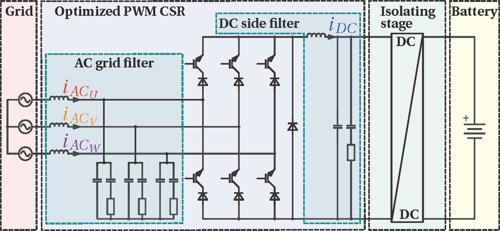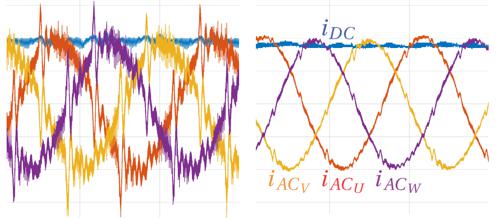Analysis, control and optimization of the pulse-width modulated current source rectifier
- Degree programme: Master of Science in Engineering
- Author: Kubilay Sahin
- Thesis advisor: Prof. Dr. Sébastien Mariéthoz
- Expert: Dr. Toufann Chaudhuri
- Year: 2021
In this work, the pulse-width modulated current source rectifier for fast DC charging of electric vehicles was investigated. By using an optimal PWM scheme, current distortions that occurred in a previous prototype were reduced. Various hardware and software issues that led to undesirable limitations in functionality were found, analyzed and resolved. Furthermore, the rectifier was optimized in terms of cost and efficiency with a model developed for this purpose using Matlab.
Context
DC charging stations are typically composed of a rectifier stage that converts AC to DC and of an isolating stage that ensures safety. For a Swiss SME, a modular charging system has already been developed at BFH in the power electronics laboratory based on a PWM voltage source rectifier (VSR).
Start point
To develop an ultra-fast DC charging converter, we now consider a PWM CSR as an alternative topology that could enable an increased energy efficiency. In a previous work, a prototype of this PWM CSR was realized without an optimized grid filter. The first tests of this prototype have shown that it could only work for low power, low input voltage, low output load and that its energy efficiency and harmonic performance were suboptimal.
Goal
The goal of this project was to design the AC grid and DC side filters, improve the performance and the operating range of this converter.
System analysis and modelling
In the first phase of the project, the prototype was analyzed, modelled, simulated and investigated experimentally. A number of flaws were discovered in the hardware and software and fixed. In particular, the PWM CSR prototype is based on a customized IGBT module from Semikron. It was found that the standard hardware protection that apply IGBT could not be applied to this and would require a redesign from the manufacturer.
Optimized PWM scheme
The current source rectifier is controlled through a PWM scheme that shall ensure sine currents with little distortion in the grid and track the desired current on the DC side. The prototype control distorted the grid currents too much. A literature review revealed that a similar distortion occurs in another topology. Building up on these ideas, a PWM scheme was designed for the PWM CSR that mitigates the current distortion and slightly reduces the converter switching losses.
Multi-objective filter design optimization
Filters are responsible for a big part of the losses and costs in power converters. For this reason, it was decided to design a 50kW filter using our Gemogand Matlab optimization tool. For this purpose, a Matlab model of the PWM CSR was derived that uses the proposed PWM scheme and a fixed filter topology with parallel RC damping. The output was the Pareto front, defining the best trade off between price and converter loss. With a power transmission of 50kW and a rectified voltage of 400V taking into account all conduction and switching losses as well as core losses, an efficiency of 98.5% at a price of 614 CHF was found as an optimal solution using a cost function which minimizes the sum of losses and costs.
Conclusion
The main output of the project is an optimized PWM CSR. The performance achieved in this work, makes the PWM CSR a serious candidate as rectifier stage for the next family of ultra-fast DC charging stations.

